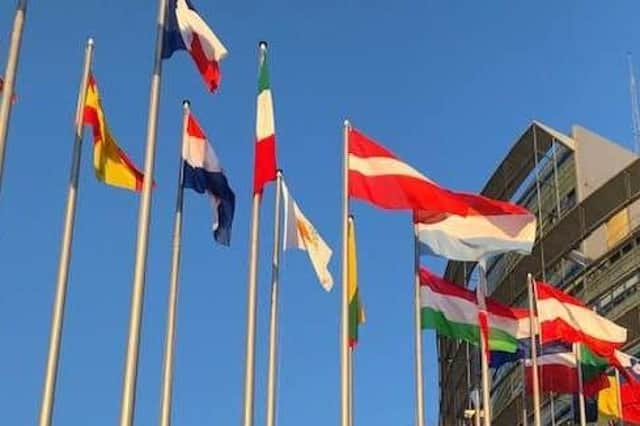Jeffrey Dudgeon: Strasbourg legacy inquiries must be brought to an end


Malone House is a Belfast-based NGO, recognised at the Council of Europe that deals with legacy issues arising from the conflict. Its object is to find the best means to address the past while preventing a re-occurrence of violence between the two communities in Northern Ireland. Our panel of experts includes lawyers, historians, human rights campaigners, academics and former civil servants.
The Group submitted a fourth legal opinion to the Council of Europe’s Committee of Ministers to its September meeting in Strasbourg about the NIO’s Legacy Bill. The 46 Ambassadors gathered to discuss a long-standing group of European Court of Human Rights (ECtHR) judgements against the UK, involving only Article 2, the right to life.
Advertisement
Hide AdAdvertisement
Hide AdThe cases date back as 1982 and include Loughgall and Pat Finucane’s. They all relate to killings by the police, army, or in the case of loyalist murders, unproven allegations of state collusion. They are not about the killing of the individuals but the adequacy and type of investigation that followed. That is so-called Article 2-Procedural, a right not in the European Convention on Human Rights (ECHR).
The Committee is the enforcement body for ECtHR judgements and has quarterly meetings to discuss outstanding cases. Ireland currently holds the Presidency of the Council of Europe with Simon Coveney chairing the Committee of Ministers. The Irish Ambassador is on the small bureau that controls the agenda of the Committee, and will be for six years.
Prompted by the Irish at the June meeting, the Committee addressed a series of questions to the UK on the new Legacy Bill. The NIO replied at length explaining how the proposed independent commission will incorporate the functions of existing inquiry bodies like the PSNI’s Legacy Investigation Branch, the Coroners Courts and the Police Ombudsman, and also Jon Boutcher’s Kenova team. It will, unusually and problematically, have a judicial head. Together, the NIO asserts, it will be compliant with Strasbourg’s Article 2. (There is a danger it just becomes a one-stop shop).
Our submitted opinion, by barrister Dr Austen Morgan, concerns the effect of recent UK Supreme Court rulings on the now restricted bite in domestic law of Article 2 of the ECHR, in particular that of December 2021 called McQuillan. Everything changed after McQuillan but nobody outside the PSNI noticed and only one legal expert at Queen’s dared write that deaths before the year 2000 need no longer be re-investigated for ‘Article 2 compliance’.
Advertisement
Hide AdAdvertisement
Hide AdDr Morgan dwelt on deep-seated problems in the Strasbourg Court, and the Committee of Ministers’ approach to Northern Ireland legacy issues in the value and effectiveness of their enforcement policy. The same Committee in previous years accepted the creation under Sir Hugh Orde of the now disbanded HET as an appropriate way forward.
Strasbourg requires punishment to be exacted over deaths but everyone accepts there will be no more prosecutions. Even Jon Boutcher of Kenova who has some 30 cases with the DPP, and more to come over the Glenanne Gang, says none are likely to end in prosecutions, let alone convictions. Criminal investigations are therefore pointless. Punishing Britain at Strasbourg – but not the terrorists – has to stop.
The legal opinion references my response in the News Letter in September 2021, to the attack by Dunja Mijatović, the Council of Europe’s Human Rights Commissioner on the government’s then proposal to end all criminal investigations. Unfazed, she launched another, after a visit to Belfast where she conspicuously avoided seeing Malone House, any political Unionists or the wrong sort of victims’ group.
Dr Morgan expresses over a serious lack of clarity on amnesty in ECtHR judgments, for example the erroneous view in the Croatian Margus case that there is a prohibition of amnesty in customary international law. It is noteworthy too that there have been at least a dozen versions of amnesty applied here since 1998, none criticised by the Committee of Ministers.
Advertisement
Hide AdAdvertisement
Hide AdMalone House feels that the Council of Europe in its various formations should review the value and purpose of these unsettled Article 2 investigations, and assess what they can still achieve. The opportunity for closure of the cases comes with the NIO’s new proposals, difficult though they may be for many – but far from all, as recent opinion polls suggest up to 40% of people favour drawing a line.
Dr Morgan also indicated the increasing failure to recognise that prolonged lawfare over the cases is worsening community relations in Northern Ireland. The Legacy Bill, although by no means perfect, is an honest and reasonable attempt to address the issues and ultimately bring about finality. Implementation of it alone comes at a cost of £250 million, on top of the £1.5 billion already spent on legacy reinvestigation.
A number of amendments to the Legacy Bill to strengthen sections related to human rights, involving, in particular neglected ECHR Articles 6 (fair trial), Article 8 (private life), and Article 10 (for the protection of the reputation or the rights of others), have been drafted for tabling after the 2nd Reading debate in the House of Lords which was postponed following the Queen’s death.
Meanwhile the Committee of Ministers, even with the UK team working to reduce the continuous strictures against Britain, lawfare under the effective control of Ireland, will get nowhere unless it starts building alliances with the less attractive European countries, ‘the bad actors’ or deplorable ones. This is hard for the Foreign Office.
Advertisement
Hide AdAdvertisement
Hide Adl Jeffrey Dudgeon is a former Ulster Unionist Party councillor, historian and Malone House Group Convenor